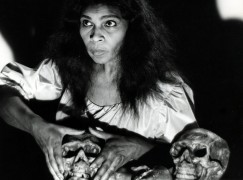The night the Met ended its race ban
mainIt’s 60 years ago tonight – January 7, 1955 – that Marian Anderson finally broke the Metropolitan Opera’s colour barrier.
We think now of American apartheid as belonging to the former slave-owning southern states. It didn’t. It existed, too, in the metropolitan heart of liberal New York.
Anderson, whose cause had been championed by no less than a president’s wife, Eleanor Roosevelt, had to wait until her late fifties to make her Met debut. On breakthrough night, she sang Ulrica, in Ballo in Maschera.
Too late for her, perhaps, but she broke the ice for others to follow.
NPR has a short feature, here.
Sixty years is not a long time. It’s within the living memory of many Met subscribers. The house should pause tonight to remember.






And, how many non-Caucasian singers sang on European opera stages 60 years ago?
Bing wanted to end the ban long before, from his first season, but the Met Chairman of the Board, George Sloan, was a southerner and a commited racist and stood in his way.
What I want to know is why are there so many fewer black artists now than there were in the 1960s through the 80s? And other than Owens or Brownlee, few the stature of Price, , Verrett, Arroyo, Norman, Bumbry, Shirley, etc.
Likewise, Jewish artists compared with the great days of Peerce, Tucker, Warren, Merrill, Peters, etc. etc.
Just part of the general decline of singing, especially in the heavier fachs?